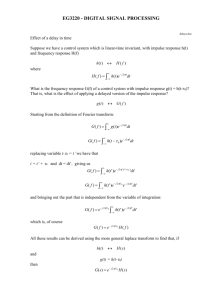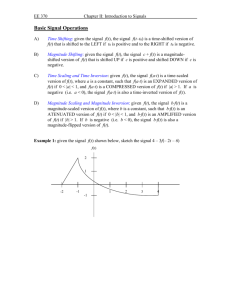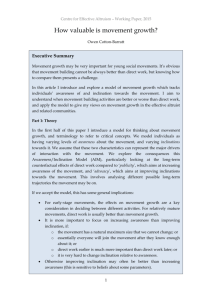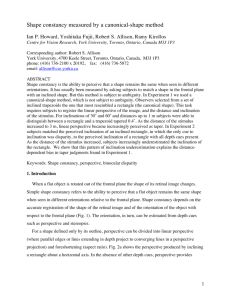Sex, Lies (without the videotape)
advertisement
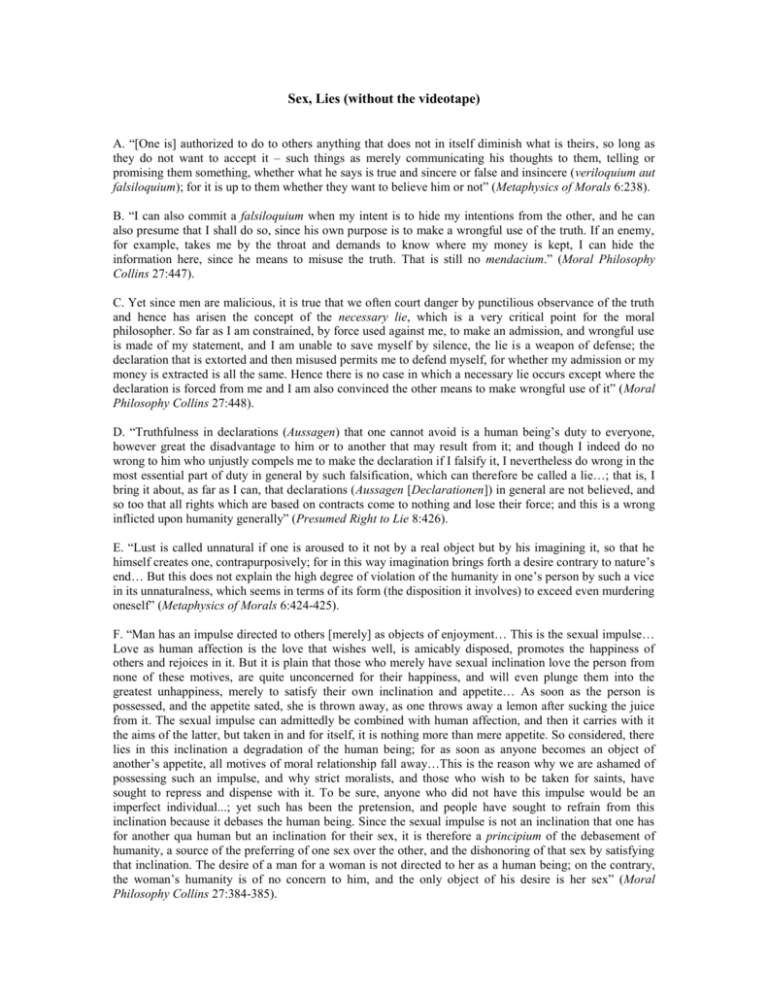
Sex, Lies (without the videotape) A. “[One is] authorized to do to others anything that does not in itself diminish what is theirs, so long as they do not want to accept it – such things as merely communicating his thoughts to them, telling or promising them something, whether what he says is true and sincere or false and insincere (veriloquium aut falsiloquium); for it is up to them whether they want to believe him or not” (Metaphysics of Morals 6:238). B. “I can also commit a falsiloquium when my intent is to hide my intentions from the other, and he can also presume that I shall do so, since his own purpose is to make a wrongful use of the truth. If an enemy, for example, takes me by the throat and demands to know where my money is kept, I can hide the information here, since he means to misuse the truth. That is still no mendacium.” (Moral Philosophy Collins 27:447). C. Yet since men are malicious, it is true that we often court danger by punctilious observance of the truth and hence has arisen the concept of the necessary lie, which is a very critical point for the moral philosopher. So far as I am constrained, by force used against me, to make an admission, and wrongful use is made of my statement, and I am unable to save myself by silence, the lie is a weapon of defense; the declaration that is extorted and then misused permits me to defend myself, for whether my admission or my money is extracted is all the same. Hence there is no case in which a necessary lie occurs except where the declaration is forced from me and I am also convinced the other means to make wrongful use of it” (Moral Philosophy Collins 27:448). D. “Truthfulness in declarations (Aussagen) that one cannot avoid is a human being’s duty to everyone, however great the disadvantage to him or to another that may result from it; and though I indeed do no wrong to him who unjustly compels me to make the declaration if I falsify it, I nevertheless do wrong in the most essential part of duty in general by such falsification, which can therefore be called a lie…; that is, I bring it about, as far as I can, that declarations (Aussagen [Declarationen]) in general are not believed, and so too that all rights which are based on contracts come to nothing and lose their force; and this is a wrong inflicted upon humanity generally” (Presumed Right to Lie 8:426). E. “Lust is called unnatural if one is aroused to it not by a real object but by his imagining it, so that he himself creates one, contrapurposively; for in this way imagination brings forth a desire contrary to nature’s end… But this does not explain the high degree of violation of the humanity in one’s person by such a vice in its unnaturalness, which seems in terms of its form (the disposition it involves) to exceed even murdering oneself” (Metaphysics of Morals 6:424-425). F. “Man has an impulse directed to others [merely] as objects of enjoyment… This is the sexual impulse… Love as human affection is the love that wishes well, is amicably disposed, promotes the happiness of others and rejoices in it. But it is plain that those who merely have sexual inclination love the person from none of these motives, are quite unconcerned for their happiness, and will even plunge them into the greatest unhappiness, merely to satisfy their own inclination and appetite… As soon as the person is possessed, and the appetite sated, she is thrown away, as one throws away a lemon after sucking the juice from it. The sexual impulse can admittedly be combined with human affection, and then it carries with it the aims of the latter, but taken in and for itself, it is nothing more than mere appetite. So considered, there lies in this inclination a degradation of the human being; for as soon as anyone becomes an object of another’s appetite, all motives of moral relationship fall away…This is the reason why we are ashamed of possessing such an impulse, and why strict moralists, and those who wish to be taken for saints, have sought to repress and dispense with it. To be sure, anyone who did not have this impulse would be an imperfect individual...; yet such has been the pretension, and people have sought to refrain from this inclination because it debases the human being. Since the sexual impulse is not an inclination that one has for another qua human but an inclination for their sex, it is therefore a principium of the debasement of humanity, a source of the preferring of one sex over the other, and the dishonoring of that sex by satisfying that inclination. The desire of a man for a woman is not directed to her as a human being; on the contrary, the woman’s humanity is of no concern to him, and the only object of his desire is her sex” (Moral Philosophy Collins 27:384-385). G. “Sexual union in accordance with law is marriage (matrimonium), that is, the union of two persons of different sexes for lifelong possession of each other’s sexual attributes…For the natural use that one sex makes of the other’s sexual organs is enjoyment, for which one gives itself up to the other. In this act a human being makes himself into a thing, which conflicts with the right of humanity in his own person. There is only one condition under which this is possible: while one person is acquired by the other as if she were a thing, the one who is acquired acquires the other in turn; for in this way each reclaims herself and restores her personality…Hence it is not only admissible for the sexes to surrender to and accept each other for enjoyment under the condition of marriage, but it is possible for them to do so only under this condition” (Metaphysics of Morals 6: 277-278). H. “Next to the instinct of nourishment, through which nature preserves every individual, the most preeminent is the sexual instinct, through which it cares for the preservation of the kind. Once reason had been stirred, it did not omit to demonstrate its influence on the latter too. The human being soon found that the stimulus to sex, which with animals rests merely on a transient, for the most part periodic impulse, was capable for him of being prolonged and even increased through the power of the imagination, whose concern, to be sure, is more with moderation, yet at the same time works more enduringly and uniformly the more its object is withdrawn from the senses, and he found that it prevents the boredom that comes along with the satisfaction of a merely animal desire. The figleaf (Genesis 3:7) was thus the product of a far greater manifestation of reason than that which it had demonstrated in the first stage of its development. For to make an inclination more inward and enduring, by withdrawing its object from the senses, shows already the consciousness of some dominion of reason over impulse and not merely, as in the first step, a faculty for doing service to those impulses within a lesser or greater extension. Refusal was the first artifice for leading from the merely sensed stimulus over to ideal ones, from merely animal desire gradually over to love, and with the latter from the feeling of the merely agreeable over to the taste for beauty, in the beginning only in human beings but then, however, also in nature. Moreover, propriety (Sittsamkeit) an inclination by good conduct (guten Anstand) to influence others to respect for us (through the concealment of that which could incite low esteem), as the genuine foundation of all true sociability, gave the first hint toward the formative education (Ausbildung) of the human being as a moral (sittlichen) creature. – A small beginning, which, however, is epoch-making, in that it gives an entirely new direction to the way of thinking -- and is more important than the entire immeasurable series of extensions of culture that followed upon it (Conjectural Beginning of Human History 8:112-113).



